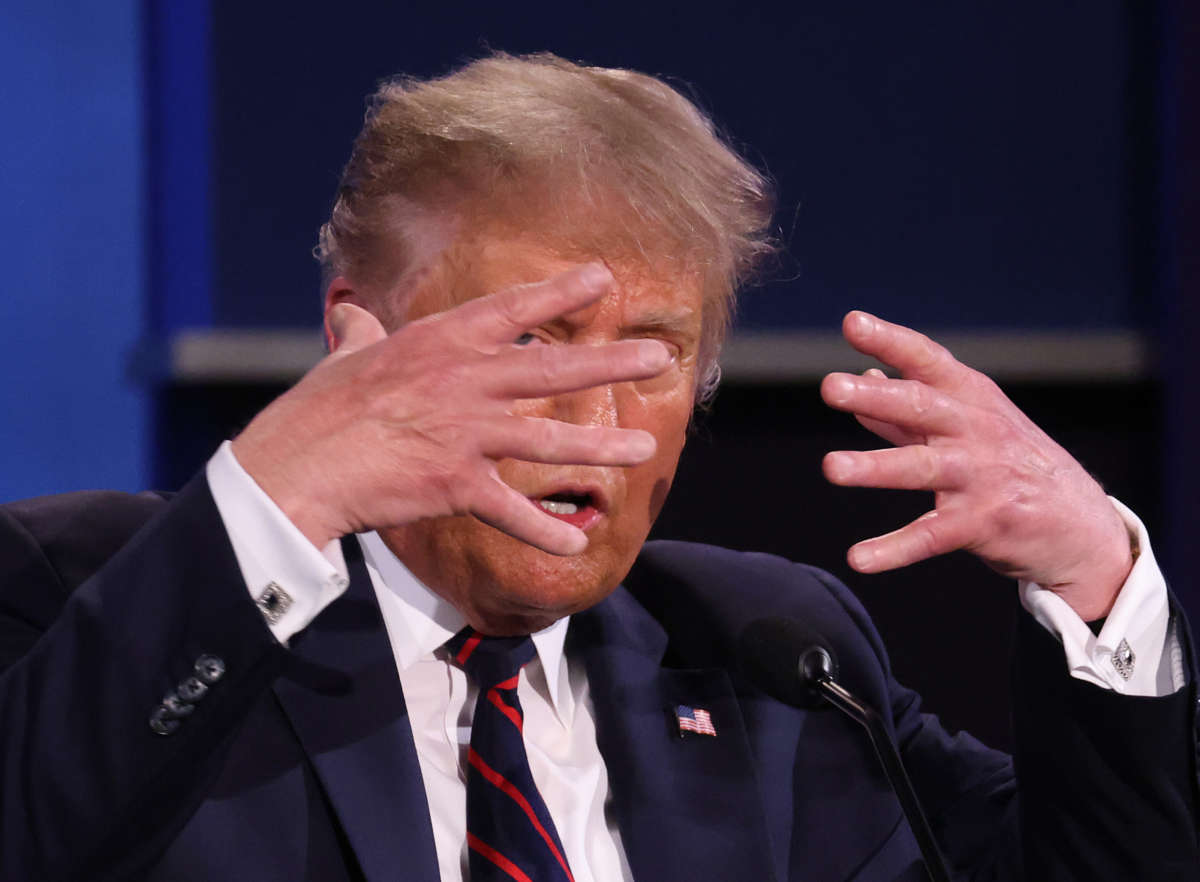Immediately after the nonpartisan Commission on Presidential Debates (CPD) announced on Thursday morning that it would hold its next debate between candidates virtually, President Donald Trump decried the idea, saying he would refuse to be a part of the event if it moved to that format.
The second debate between Trump and Democratic presidential nominee Joe Biden, set to take place next week in Miami, was to be a town hall-style setup, with undecided voters asking questions of each of the candidates.
The CPD said its decision to change from an in-person debate to a virtual one was made in order “to protect the health and safety of all involved.” Under the rule change, both candidates would answer questions from separate locations instead of from the same debate hall.
The Biden campaign indicated it would accept the changes proposed by the nonpartisan CPD on how the candidates would debate.
“Vice President Biden looks forward to speaking directly to the American people and comparing his plan for bringing the country together and building back better with Donald Trump’s failed leadership on the coronavirus that has thrown the strong economy he inherited into the worst downturn since the Great Depression,” Biden campaign communications director Kate Bedingfield said in a statement.
But the president himself forcefully rejected the plan, telling Fox Business’s Maria Bartiromo that the change was “not acceptable to us.”
“I’m not going to waste my time on a virtual debate, that’s not what debating is all about,” Trump said. “You sit behind a computer and do a debate. It’s ridiculous.”
Although extremely uncommon, a debate where both candidates discuss the issues from remote locations has happened in the past. When Richard Nixon and John F. Kennedy debated each other in the third debate of the 1960 election campaign, they did it from Los Angeles and New York, respectively, with the moderator asking questions from Chicago.
The announced change in format to a virtual debate comes a week after Trump was diagnosed with COVID-19. Over the weekend, the president was airlifted by helicopter to Walter Reed National Military Medical Center as his condition worsened. Yet by Monday, Trump left the hospital and returned to the White House, against the advice of his aides, and began to downplay the threat of the disease, much like he has since the beginning of the crisis.
Trump is reportedly still being treated for coronavirus, taking the steroid medication dexamethasone, which doctors say can make patients feel better than they actually are. Anthony Fauci, the director of the National Institute of Allergy and Infectious Diseases and a member of the White House’s coronavirus task force, said earlier this week that while Trump may say he feels better at the moment, a “reversal” of Trump’s condition, where he could start “going in the wrong direction” in terms of recovery, is possible between now and next week.
With those possibilities in mind, experts have also warned that Trump would still likely be infectious by the time the next debate is scheduled to take place. That would mean he would put everyone in the debate hall at risk of contracting COVID-19, including Biden, the moderator and audience members, if the event were held in a studio.
People close to the president, including his eldest son Donald Trump Jr., immediately tried to spin the proposed changes to the next debate by suggesting they were happening in order to benefit Biden. Trump Jr. specifically implied that the change came about due to what he said happened at the vice presidential debate on Wednesday evening.
“Does anyone else find it awfully coincidental that the morning after [Vice President] Mike Pence destroys [Democratic vice presidential nominee] Kamala Harris in a debate that the ‘debate commission’ unilaterally changes the format to obviously benefit Basement Biden?” Trump Jr. opined in a tweet.
Trump Jr.’s notion that Pence won the debate is not shared by everyone, however. A snap poll conducted by CNN after that debate ended last night found that 59 percent of those who watched the debate felt Harris had won, with only 38 percent believing Pence had a better performance. Similarly, polls after the first debate between Biden and Trump found that the former had performed better as well.
Trump is silencing political dissent. We appeal for your support.
Progressive nonprofits are the latest target caught in Trump’s crosshairs. With the aim of eliminating political opposition, Trump and his sycophants are working to curb government funding, constrain private foundations, and even cut tax-exempt status from organizations he dislikes.
We’re concerned, because Truthout is not immune to such bad-faith attacks.
We can only resist Trump’s attacks by cultivating a strong base of support. The right-wing mediasphere is funded comfortably by billionaire owners and venture capitalist philanthropists. At Truthout, we have you.
Truthout has launched a fundraiser, and we have only 48 hours left to raise $22,000. Please take a meaningful action in the fight against authoritarianism: make a one-time or monthly donation to Truthout. If you have the means, please dig deep.
